Protocols for Reporting in Youth Justice: Report on Ethical Problems and Strategies
VerifiedAdded on 2023/06/18
|12
|4208
|469
AI Summary
This report discusses the ethical problems in Youth Justice and suggests strategies to prevent future unethical conduct. It also outlines the protocol for reporting unethical conduct concerns in the Youth Justice environment. The report includes a scenario of a Youth Justice Worker and their co-worker's unethical behaviour towards the youth. The report answers questions related to ethical principles, decision-making process, and the Equal Opportunity Act 2010. The report recommends strategies such as taking feedback from the youths and providing proper training & development to employees to prevent future unethical conduct.
Contribute Materials
Your contribution can guide someone’s learning journey. Share your
documents today.
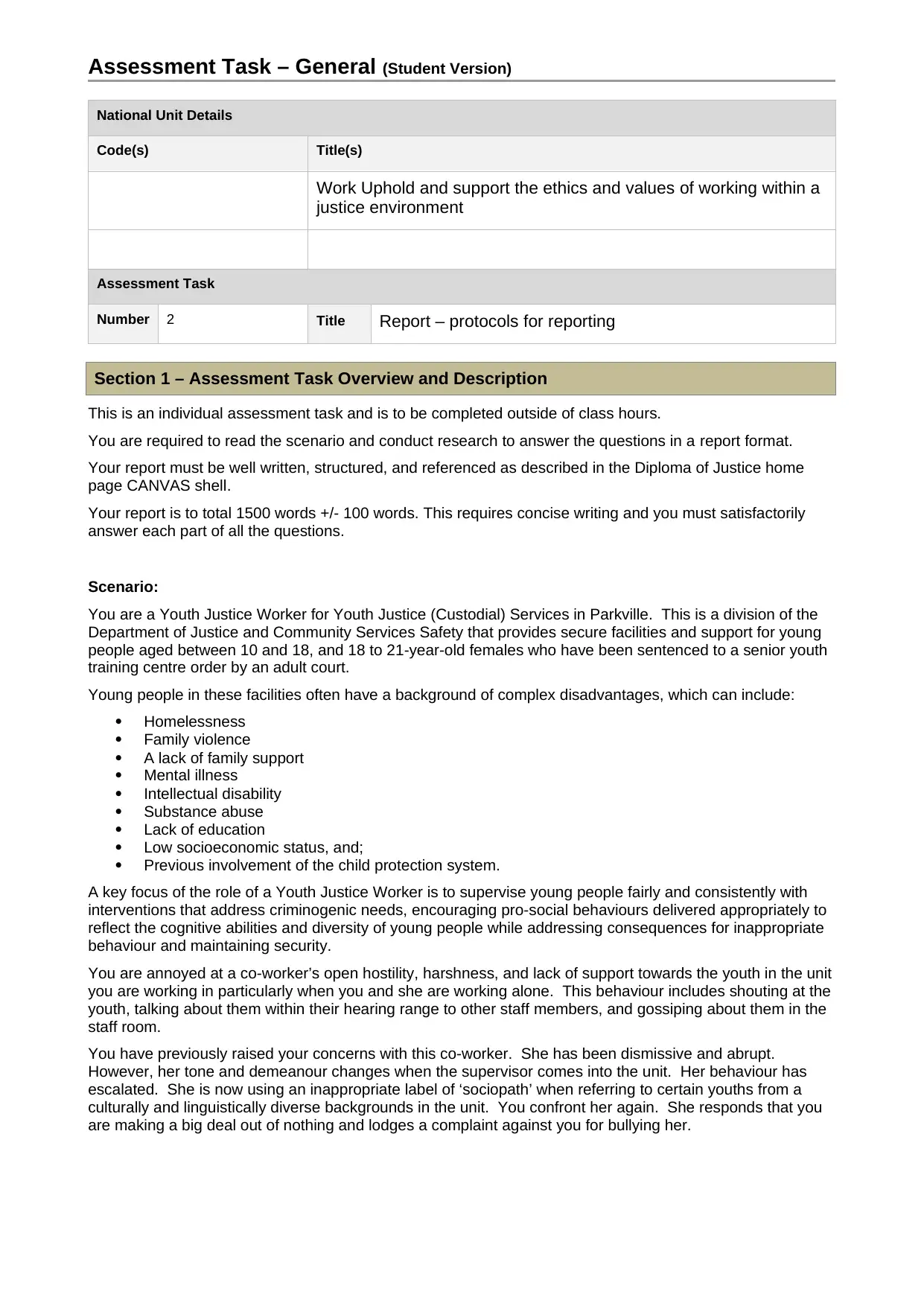
Assessment Task – General (Student Version)
National Unit Details
Code(s) Title(s)
Work Uphold and support the ethics and values of working within a
justice environment
Assessment Task
Number 2 Title Report – protocols for reporting
Section 1 – Assessment Task Overview and Description
This is an individual assessment task and is to be completed outside of class hours.
You are required to read the scenario and conduct research to answer the questions in a report format.
Your report must be well written, structured, and referenced as described in the Diploma of Justice home
page CANVAS shell.
Your report is to total 1500 words +/- 100 words. This requires concise writing and you must satisfactorily
answer each part of all the questions.
Scenario:
You are a Youth Justice Worker for Youth Justice (Custodial) Services in Parkville. This is a division of the
Department of Justice and Community Services Safety that provides secure facilities and support for young
people aged between 10 and 18, and 18 to 21-year-old females who have been sentenced to a senior youth
training centre order by an adult court.
Young people in these facilities often have a background of complex disadvantages, which can include:
Homelessness
Family violence
A lack of family support
Mental illness
Intellectual disability
Substance abuse
Lack of education
Low socioeconomic status, and;
Previous involvement of the child protection system.
A key focus of the role of a Youth Justice Worker is to supervise young people fairly and consistently with
interventions that address criminogenic needs, encouraging pro-social behaviours delivered appropriately to
reflect the cognitive abilities and diversity of young people while addressing consequences for inappropriate
behaviour and maintaining security.
You are annoyed at a co-worker’s open hostility, harshness, and lack of support towards the youth in the unit
you are working in particularly when you and she are working alone. This behaviour includes shouting at the
youth, talking about them within their hearing range to other staff members, and gossiping about them in the
staff room.
You have previously raised your concerns with this co-worker. She has been dismissive and abrupt.
However, her tone and demeanour changes when the supervisor comes into the unit. Her behaviour has
escalated. She is now using an inappropriate label of ‘sociopath’ when referring to certain youths from a
culturally and linguistically diverse backgrounds in the unit. You confront her again. She responds that you
are making a big deal out of nothing and lodges a complaint against you for bullying her.
National Unit Details
Code(s) Title(s)
Work Uphold and support the ethics and values of working within a
justice environment
Assessment Task
Number 2 Title Report – protocols for reporting
Section 1 – Assessment Task Overview and Description
This is an individual assessment task and is to be completed outside of class hours.
You are required to read the scenario and conduct research to answer the questions in a report format.
Your report must be well written, structured, and referenced as described in the Diploma of Justice home
page CANVAS shell.
Your report is to total 1500 words +/- 100 words. This requires concise writing and you must satisfactorily
answer each part of all the questions.
Scenario:
You are a Youth Justice Worker for Youth Justice (Custodial) Services in Parkville. This is a division of the
Department of Justice and Community Services Safety that provides secure facilities and support for young
people aged between 10 and 18, and 18 to 21-year-old females who have been sentenced to a senior youth
training centre order by an adult court.
Young people in these facilities often have a background of complex disadvantages, which can include:
Homelessness
Family violence
A lack of family support
Mental illness
Intellectual disability
Substance abuse
Lack of education
Low socioeconomic status, and;
Previous involvement of the child protection system.
A key focus of the role of a Youth Justice Worker is to supervise young people fairly and consistently with
interventions that address criminogenic needs, encouraging pro-social behaviours delivered appropriately to
reflect the cognitive abilities and diversity of young people while addressing consequences for inappropriate
behaviour and maintaining security.
You are annoyed at a co-worker’s open hostility, harshness, and lack of support towards the youth in the unit
you are working in particularly when you and she are working alone. This behaviour includes shouting at the
youth, talking about them within their hearing range to other staff members, and gossiping about them in the
staff room.
You have previously raised your concerns with this co-worker. She has been dismissive and abrupt.
However, her tone and demeanour changes when the supervisor comes into the unit. Her behaviour has
escalated. She is now using an inappropriate label of ‘sociopath’ when referring to certain youths from a
culturally and linguistically diverse backgrounds in the unit. You confront her again. She responds that you
are making a big deal out of nothing and lodges a complaint against you for bullying her.
Secure Best Marks with AI Grader
Need help grading? Try our AI Grader for instant feedback on your assignments.
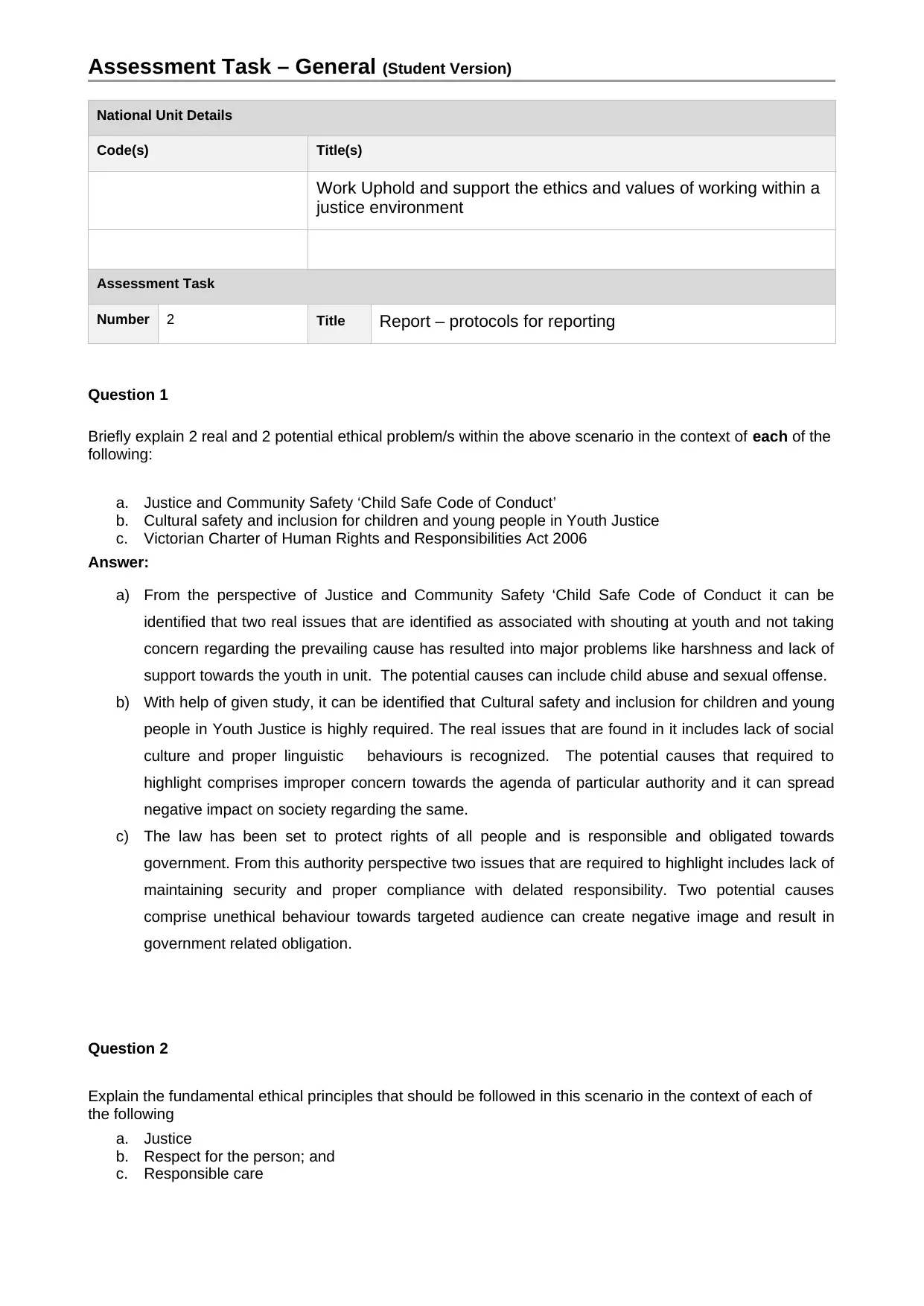
Assessment Task – General (Student Version)
National Unit Details
Code(s) Title(s)
Work Uphold and support the ethics and values of working within a
justice environment
Assessment Task
Number 2 Title Report – protocols for reporting
Question 1
Briefly explain 2 real and 2 potential ethical problem/s within the above scenario in the context of each of the
following:
a. Justice and Community Safety ‘Child Safe Code of Conduct’
b. Cultural safety and inclusion for children and young people in Youth Justice
c. Victorian Charter of Human Rights and Responsibilities Act 2006
Answer:
a) From the perspective of Justice and Community Safety ‘Child Safe Code of Conduct it can be
identified that two real issues that are identified as associated with shouting at youth and not taking
concern regarding the prevailing cause has resulted into major problems like harshness and lack of
support towards the youth in unit. The potential causes can include child abuse and sexual offense.
b) With help of given study, it can be identified that Cultural safety and inclusion for children and young
people in Youth Justice is highly required. The real issues that are found in it includes lack of social
culture and proper linguistic behaviours is recognized. The potential causes that required to
highlight comprises improper concern towards the agenda of particular authority and it can spread
negative impact on society regarding the same.
c) The law has been set to protect rights of all people and is responsible and obligated towards
government. From this authority perspective two issues that are required to highlight includes lack of
maintaining security and proper compliance with delated responsibility. Two potential causes
comprise unethical behaviour towards targeted audience can create negative image and result in
government related obligation.
Question 2
Explain the fundamental ethical principles that should be followed in this scenario in the context of each of
the following
a. Justice
b. Respect for the person; and
c. Responsible care
National Unit Details
Code(s) Title(s)
Work Uphold and support the ethics and values of working within a
justice environment
Assessment Task
Number 2 Title Report – protocols for reporting
Question 1
Briefly explain 2 real and 2 potential ethical problem/s within the above scenario in the context of each of the
following:
a. Justice and Community Safety ‘Child Safe Code of Conduct’
b. Cultural safety and inclusion for children and young people in Youth Justice
c. Victorian Charter of Human Rights and Responsibilities Act 2006
Answer:
a) From the perspective of Justice and Community Safety ‘Child Safe Code of Conduct it can be
identified that two real issues that are identified as associated with shouting at youth and not taking
concern regarding the prevailing cause has resulted into major problems like harshness and lack of
support towards the youth in unit. The potential causes can include child abuse and sexual offense.
b) With help of given study, it can be identified that Cultural safety and inclusion for children and young
people in Youth Justice is highly required. The real issues that are found in it includes lack of social
culture and proper linguistic behaviours is recognized. The potential causes that required to
highlight comprises improper concern towards the agenda of particular authority and it can spread
negative impact on society regarding the same.
c) The law has been set to protect rights of all people and is responsible and obligated towards
government. From this authority perspective two issues that are required to highlight includes lack of
maintaining security and proper compliance with delated responsibility. Two potential causes
comprise unethical behaviour towards targeted audience can create negative image and result in
government related obligation.
Question 2
Explain the fundamental ethical principles that should be followed in this scenario in the context of each of
the following
a. Justice
b. Respect for the person; and
c. Responsible care
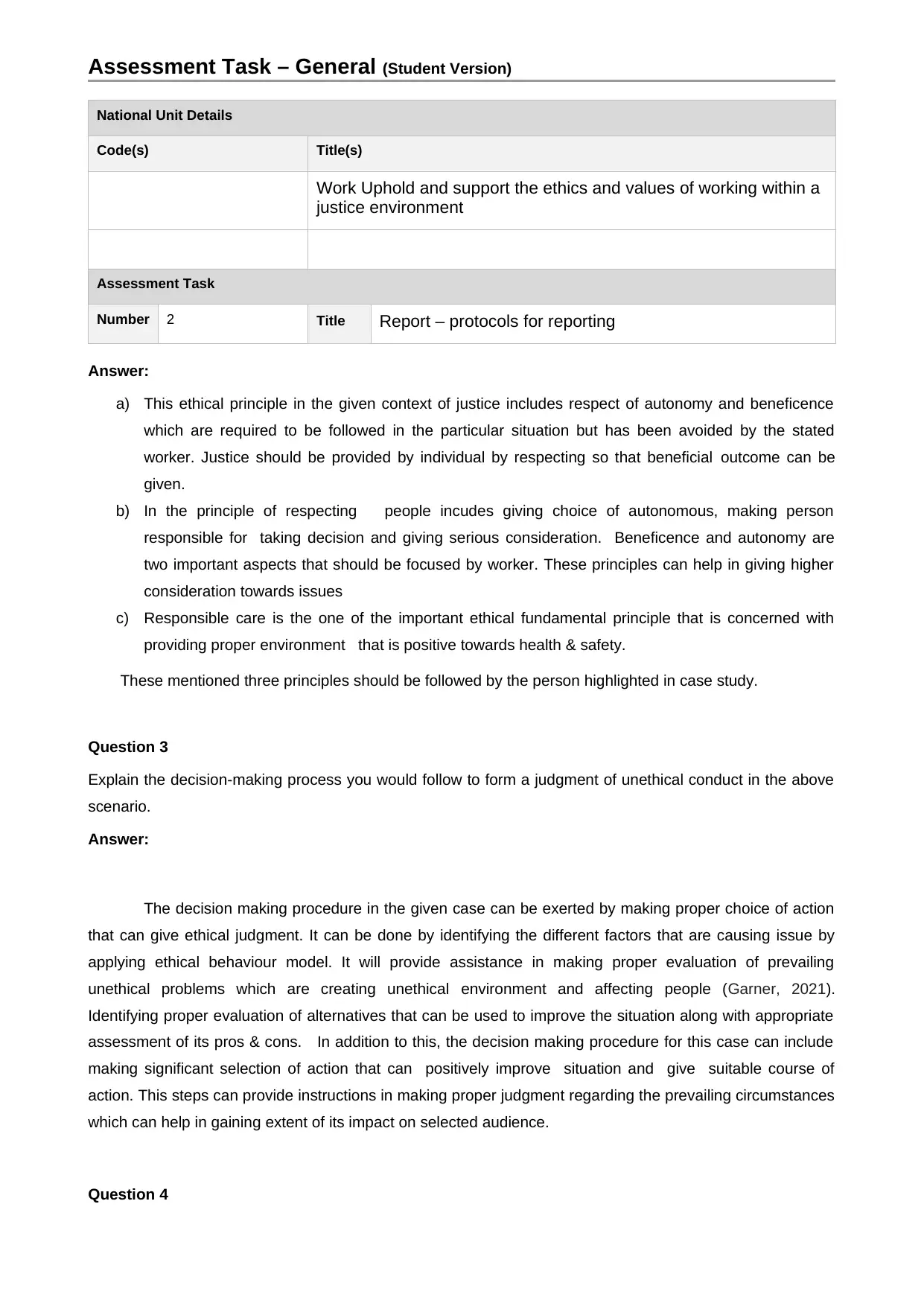
Assessment Task – General (Student Version)
National Unit Details
Code(s) Title(s)
Work Uphold and support the ethics and values of working within a
justice environment
Assessment Task
Number 2 Title Report – protocols for reporting
Answer:
a) This ethical principle in the given context of justice includes respect of autonomy and beneficence
which are required to be followed in the particular situation but has been avoided by the stated
worker. Justice should be provided by individual by respecting so that beneficial outcome can be
given.
b) In the principle of respecting people incudes giving choice of autonomous, making person
responsible for taking decision and giving serious consideration. Beneficence and autonomy are
two important aspects that should be focused by worker. These principles can help in giving higher
consideration towards issues
c) Responsible care is the one of the important ethical fundamental principle that is concerned with
providing proper environment that is positive towards health & safety.
These mentioned three principles should be followed by the person highlighted in case study.
Question 3
Explain the decision-making process you would follow to form a judgment of unethical conduct in the above
scenario.
Answer:
The decision making procedure in the given case can be exerted by making proper choice of action
that can give ethical judgment. It can be done by identifying the different factors that are causing issue by
applying ethical behaviour model. It will provide assistance in making proper evaluation of prevailing
unethical problems which are creating unethical environment and affecting people (Garner, 2021).
Identifying proper evaluation of alternatives that can be used to improve the situation along with appropriate
assessment of its pros & cons. In addition to this, the decision making procedure for this case can include
making significant selection of action that can positively improve situation and give suitable course of
action. This steps can provide instructions in making proper judgment regarding the prevailing circumstances
which can help in gaining extent of its impact on selected audience.
Question 4
National Unit Details
Code(s) Title(s)
Work Uphold and support the ethics and values of working within a
justice environment
Assessment Task
Number 2 Title Report – protocols for reporting
Answer:
a) This ethical principle in the given context of justice includes respect of autonomy and beneficence
which are required to be followed in the particular situation but has been avoided by the stated
worker. Justice should be provided by individual by respecting so that beneficial outcome can be
given.
b) In the principle of respecting people incudes giving choice of autonomous, making person
responsible for taking decision and giving serious consideration. Beneficence and autonomy are
two important aspects that should be focused by worker. These principles can help in giving higher
consideration towards issues
c) Responsible care is the one of the important ethical fundamental principle that is concerned with
providing proper environment that is positive towards health & safety.
These mentioned three principles should be followed by the person highlighted in case study.
Question 3
Explain the decision-making process you would follow to form a judgment of unethical conduct in the above
scenario.
Answer:
The decision making procedure in the given case can be exerted by making proper choice of action
that can give ethical judgment. It can be done by identifying the different factors that are causing issue by
applying ethical behaviour model. It will provide assistance in making proper evaluation of prevailing
unethical problems which are creating unethical environment and affecting people (Garner, 2021).
Identifying proper evaluation of alternatives that can be used to improve the situation along with appropriate
assessment of its pros & cons. In addition to this, the decision making procedure for this case can include
making significant selection of action that can positively improve situation and give suitable course of
action. This steps can provide instructions in making proper judgment regarding the prevailing circumstances
which can help in gaining extent of its impact on selected audience.
Question 4
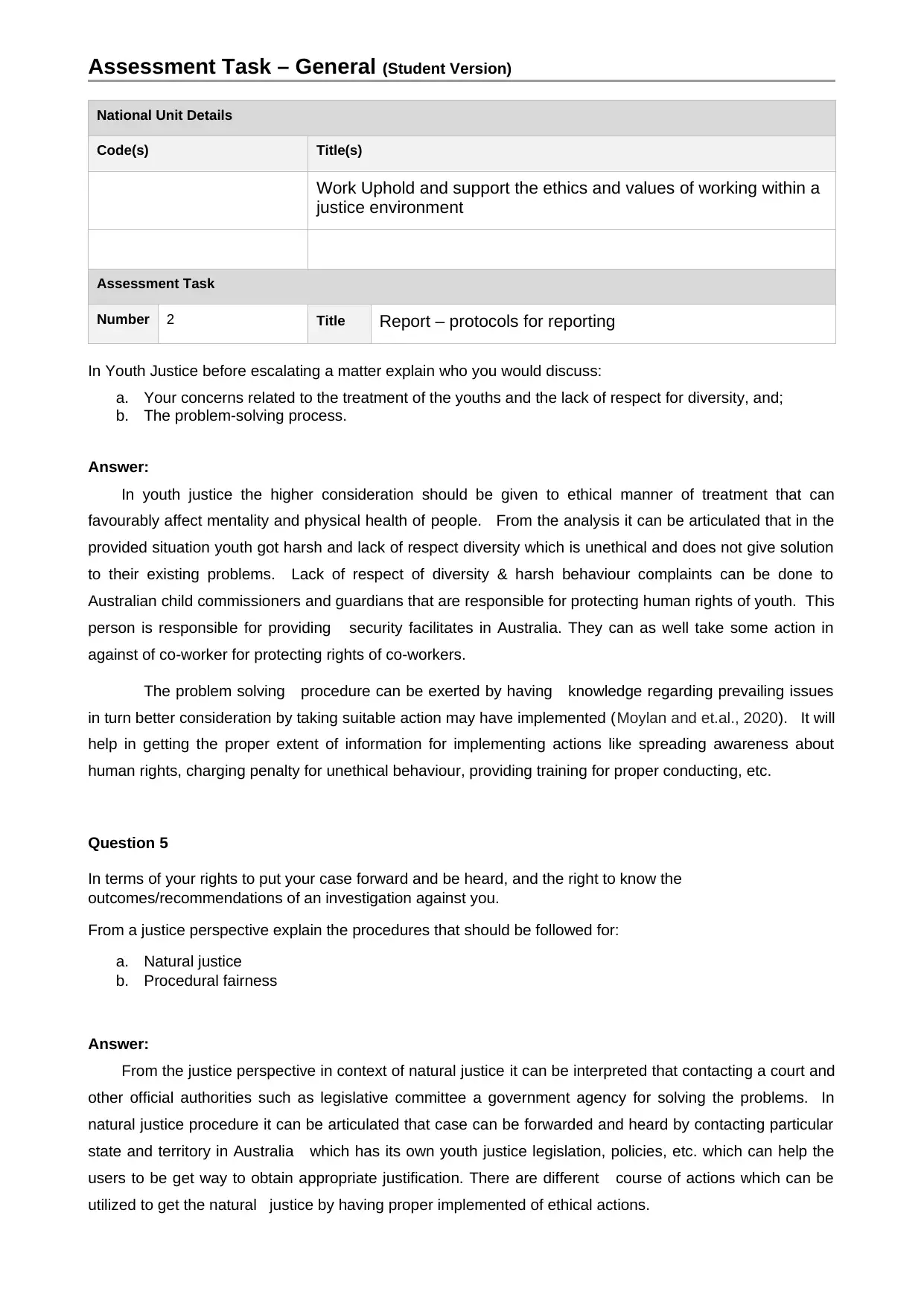
Assessment Task – General (Student Version)
National Unit Details
Code(s) Title(s)
Work Uphold and support the ethics and values of working within a
justice environment
Assessment Task
Number 2 Title Report – protocols for reporting
In Youth Justice before escalating a matter explain who you would discuss:
a. Your concerns related to the treatment of the youths and the lack of respect for diversity, and;
b. The problem-solving process.
Answer:
In youth justice the higher consideration should be given to ethical manner of treatment that can
favourably affect mentality and physical health of people. From the analysis it can be articulated that in the
provided situation youth got harsh and lack of respect diversity which is unethical and does not give solution
to their existing problems. Lack of respect of diversity & harsh behaviour complaints can be done to
Australian child commissioners and guardians that are responsible for protecting human rights of youth. This
person is responsible for providing security facilitates in Australia. They can as well take some action in
against of co-worker for protecting rights of co-workers.
The problem solving procedure can be exerted by having knowledge regarding prevailing issues
in turn better consideration by taking suitable action may have implemented (Moylan and et.al., 2020). It will
help in getting the proper extent of information for implementing actions like spreading awareness about
human rights, charging penalty for unethical behaviour, providing training for proper conducting, etc.
Question 5
In terms of your rights to put your case forward and be heard, and the right to know the
outcomes/recommendations of an investigation against you.
From a justice perspective explain the procedures that should be followed for:
a. Natural justice
b. Procedural fairness
Answer:
From the justice perspective in context of natural justice it can be interpreted that contacting a court and
other official authorities such as legislative committee a government agency for solving the problems. In
natural justice procedure it can be articulated that case can be forwarded and heard by contacting particular
state and territory in Australia which has its own youth justice legislation, policies, etc. which can help the
users to be get way to obtain appropriate justification. There are different course of actions which can be
utilized to get the natural justice by having proper implemented of ethical actions.
National Unit Details
Code(s) Title(s)
Work Uphold and support the ethics and values of working within a
justice environment
Assessment Task
Number 2 Title Report – protocols for reporting
In Youth Justice before escalating a matter explain who you would discuss:
a. Your concerns related to the treatment of the youths and the lack of respect for diversity, and;
b. The problem-solving process.
Answer:
In youth justice the higher consideration should be given to ethical manner of treatment that can
favourably affect mentality and physical health of people. From the analysis it can be articulated that in the
provided situation youth got harsh and lack of respect diversity which is unethical and does not give solution
to their existing problems. Lack of respect of diversity & harsh behaviour complaints can be done to
Australian child commissioners and guardians that are responsible for protecting human rights of youth. This
person is responsible for providing security facilitates in Australia. They can as well take some action in
against of co-worker for protecting rights of co-workers.
The problem solving procedure can be exerted by having knowledge regarding prevailing issues
in turn better consideration by taking suitable action may have implemented (Moylan and et.al., 2020). It will
help in getting the proper extent of information for implementing actions like spreading awareness about
human rights, charging penalty for unethical behaviour, providing training for proper conducting, etc.
Question 5
In terms of your rights to put your case forward and be heard, and the right to know the
outcomes/recommendations of an investigation against you.
From a justice perspective explain the procedures that should be followed for:
a. Natural justice
b. Procedural fairness
Answer:
From the justice perspective in context of natural justice it can be interpreted that contacting a court and
other official authorities such as legislative committee a government agency for solving the problems. In
natural justice procedure it can be articulated that case can be forwarded and heard by contacting particular
state and territory in Australia which has its own youth justice legislation, policies, etc. which can help the
users to be get way to obtain appropriate justification. There are different course of actions which can be
utilized to get the natural justice by having proper implemented of ethical actions.
Secure Best Marks with AI Grader
Need help grading? Try our AI Grader for instant feedback on your assignments.
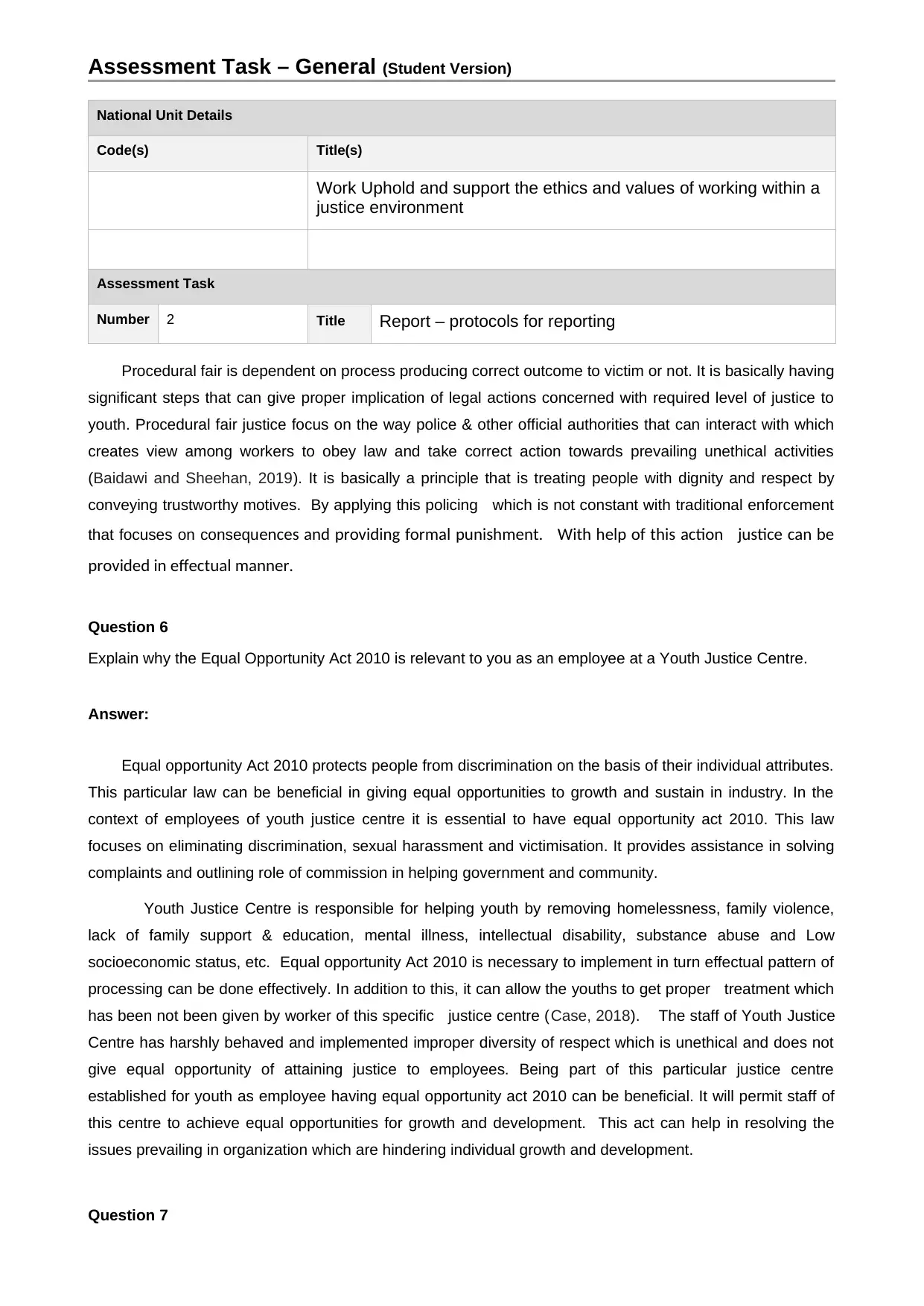
Assessment Task – General (Student Version)
National Unit Details
Code(s) Title(s)
Work Uphold and support the ethics and values of working within a
justice environment
Assessment Task
Number 2 Title Report – protocols for reporting
Procedural fair is dependent on process producing correct outcome to victim or not. It is basically having
significant steps that can give proper implication of legal actions concerned with required level of justice to
youth. Procedural fair justice focus on the way police & other official authorities that can interact with which
creates view among workers to obey law and take correct action towards prevailing unethical activities
(Baidawi and Sheehan, 2019). It is basically a principle that is treating people with dignity and respect by
conveying trustworthy motives. By applying this policing which is not constant with traditional enforcement
that focuses on consequences and providing formal punishment. With help of this action justice can be
provided in effectual manner.
Question 6
Explain why the Equal Opportunity Act 2010 is relevant to you as an employee at a Youth Justice Centre.
Answer:
Equal opportunity Act 2010 protects people from discrimination on the basis of their individual attributes.
This particular law can be beneficial in giving equal opportunities to growth and sustain in industry. In the
context of employees of youth justice centre it is essential to have equal opportunity act 2010. This law
focuses on eliminating discrimination, sexual harassment and victimisation. It provides assistance in solving
complaints and outlining role of commission in helping government and community.
Youth Justice Centre is responsible for helping youth by removing homelessness, family violence,
lack of family support & education, mental illness, intellectual disability, substance abuse and Low
socioeconomic status, etc. Equal opportunity Act 2010 is necessary to implement in turn effectual pattern of
processing can be done effectively. In addition to this, it can allow the youths to get proper treatment which
has been not been given by worker of this specific justice centre (Case, 2018). The staff of Youth Justice
Centre has harshly behaved and implemented improper diversity of respect which is unethical and does not
give equal opportunity of attaining justice to employees. Being part of this particular justice centre
established for youth as employee having equal opportunity act 2010 can be beneficial. It will permit staff of
this centre to achieve equal opportunities for growth and development. This act can help in resolving the
issues prevailing in organization which are hindering individual growth and development.
Question 7
National Unit Details
Code(s) Title(s)
Work Uphold and support the ethics and values of working within a
justice environment
Assessment Task
Number 2 Title Report – protocols for reporting
Procedural fair is dependent on process producing correct outcome to victim or not. It is basically having
significant steps that can give proper implication of legal actions concerned with required level of justice to
youth. Procedural fair justice focus on the way police & other official authorities that can interact with which
creates view among workers to obey law and take correct action towards prevailing unethical activities
(Baidawi and Sheehan, 2019). It is basically a principle that is treating people with dignity and respect by
conveying trustworthy motives. By applying this policing which is not constant with traditional enforcement
that focuses on consequences and providing formal punishment. With help of this action justice can be
provided in effectual manner.
Question 6
Explain why the Equal Opportunity Act 2010 is relevant to you as an employee at a Youth Justice Centre.
Answer:
Equal opportunity Act 2010 protects people from discrimination on the basis of their individual attributes.
This particular law can be beneficial in giving equal opportunities to growth and sustain in industry. In the
context of employees of youth justice centre it is essential to have equal opportunity act 2010. This law
focuses on eliminating discrimination, sexual harassment and victimisation. It provides assistance in solving
complaints and outlining role of commission in helping government and community.
Youth Justice Centre is responsible for helping youth by removing homelessness, family violence,
lack of family support & education, mental illness, intellectual disability, substance abuse and Low
socioeconomic status, etc. Equal opportunity Act 2010 is necessary to implement in turn effectual pattern of
processing can be done effectively. In addition to this, it can allow the youths to get proper treatment which
has been not been given by worker of this specific justice centre (Case, 2018). The staff of Youth Justice
Centre has harshly behaved and implemented improper diversity of respect which is unethical and does not
give equal opportunity of attaining justice to employees. Being part of this particular justice centre
established for youth as employee having equal opportunity act 2010 can be beneficial. It will permit staff of
this centre to achieve equal opportunities for growth and development. This act can help in resolving the
issues prevailing in organization which are hindering individual growth and development.
Question 7
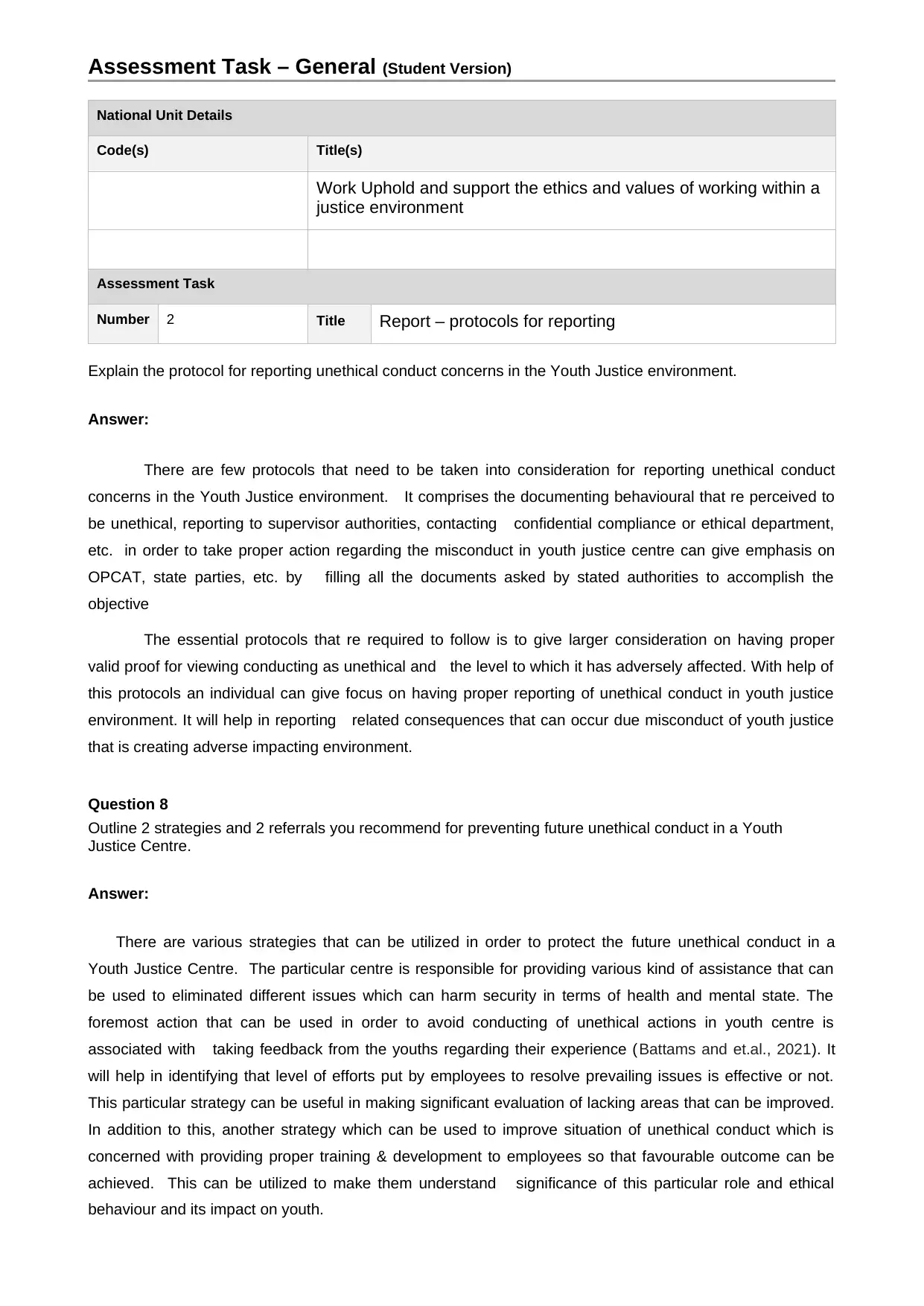
Assessment Task – General (Student Version)
National Unit Details
Code(s) Title(s)
Work Uphold and support the ethics and values of working within a
justice environment
Assessment Task
Number 2 Title Report – protocols for reporting
Explain the protocol for reporting unethical conduct concerns in the Youth Justice environment.
Answer:
There are few protocols that need to be taken into consideration for reporting unethical conduct
concerns in the Youth Justice environment. It comprises the documenting behavioural that re perceived to
be unethical, reporting to supervisor authorities, contacting confidential compliance or ethical department,
etc. in order to take proper action regarding the misconduct in youth justice centre can give emphasis on
OPCAT, state parties, etc. by filling all the documents asked by stated authorities to accomplish the
objective
The essential protocols that re required to follow is to give larger consideration on having proper
valid proof for viewing conducting as unethical and the level to which it has adversely affected. With help of
this protocols an individual can give focus on having proper reporting of unethical conduct in youth justice
environment. It will help in reporting related consequences that can occur due misconduct of youth justice
that is creating adverse impacting environment.
Question 8
Outline 2 strategies and 2 referrals you recommend for preventing future unethical conduct in a Youth
Justice Centre.
Answer:
There are various strategies that can be utilized in order to protect the future unethical conduct in a
Youth Justice Centre. The particular centre is responsible for providing various kind of assistance that can
be used to eliminated different issues which can harm security in terms of health and mental state. The
foremost action that can be used in order to avoid conducting of unethical actions in youth centre is
associated with taking feedback from the youths regarding their experience (Battams and et.al., 2021). It
will help in identifying that level of efforts put by employees to resolve prevailing issues is effective or not.
This particular strategy can be useful in making significant evaluation of lacking areas that can be improved.
In addition to this, another strategy which can be used to improve situation of unethical conduct which is
concerned with providing proper training & development to employees so that favourable outcome can be
achieved. This can be utilized to make them understand significance of this particular role and ethical
behaviour and its impact on youth.
National Unit Details
Code(s) Title(s)
Work Uphold and support the ethics and values of working within a
justice environment
Assessment Task
Number 2 Title Report – protocols for reporting
Explain the protocol for reporting unethical conduct concerns in the Youth Justice environment.
Answer:
There are few protocols that need to be taken into consideration for reporting unethical conduct
concerns in the Youth Justice environment. It comprises the documenting behavioural that re perceived to
be unethical, reporting to supervisor authorities, contacting confidential compliance or ethical department,
etc. in order to take proper action regarding the misconduct in youth justice centre can give emphasis on
OPCAT, state parties, etc. by filling all the documents asked by stated authorities to accomplish the
objective
The essential protocols that re required to follow is to give larger consideration on having proper
valid proof for viewing conducting as unethical and the level to which it has adversely affected. With help of
this protocols an individual can give focus on having proper reporting of unethical conduct in youth justice
environment. It will help in reporting related consequences that can occur due misconduct of youth justice
that is creating adverse impacting environment.
Question 8
Outline 2 strategies and 2 referrals you recommend for preventing future unethical conduct in a Youth
Justice Centre.
Answer:
There are various strategies that can be utilized in order to protect the future unethical conduct in a
Youth Justice Centre. The particular centre is responsible for providing various kind of assistance that can
be used to eliminated different issues which can harm security in terms of health and mental state. The
foremost action that can be used in order to avoid conducting of unethical actions in youth centre is
associated with taking feedback from the youths regarding their experience (Battams and et.al., 2021). It
will help in identifying that level of efforts put by employees to resolve prevailing issues is effective or not.
This particular strategy can be useful in making significant evaluation of lacking areas that can be improved.
In addition to this, another strategy which can be used to improve situation of unethical conduct which is
concerned with providing proper training & development to employees so that favourable outcome can be
achieved. This can be utilized to make them understand significance of this particular role and ethical
behaviour and its impact on youth.
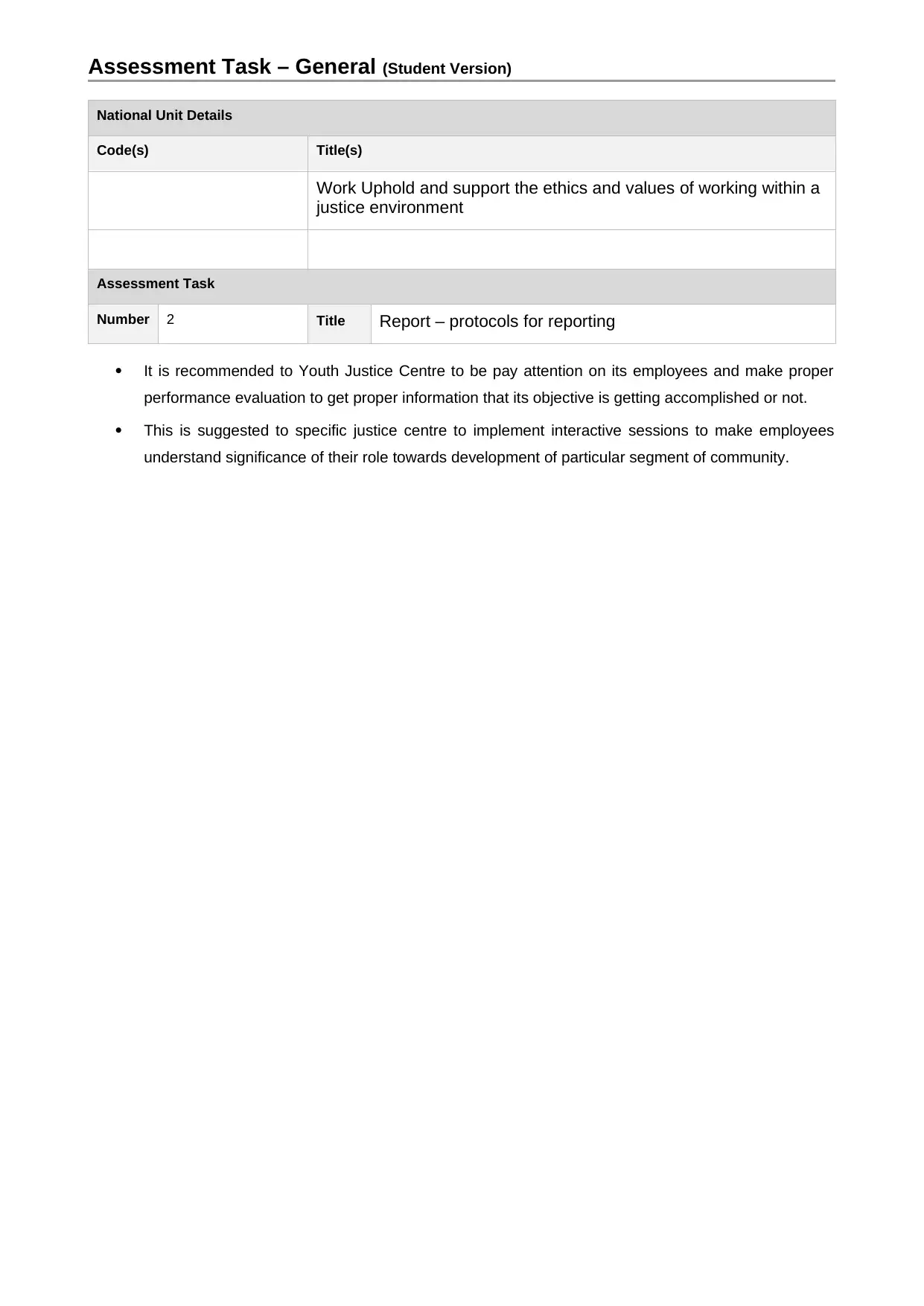
Assessment Task – General (Student Version)
National Unit Details
Code(s) Title(s)
Work Uphold and support the ethics and values of working within a
justice environment
Assessment Task
Number 2 Title Report – protocols for reporting
It is recommended to Youth Justice Centre to be pay attention on its employees and make proper
performance evaluation to get proper information that its objective is getting accomplished or not.
This is suggested to specific justice centre to implement interactive sessions to make employees
understand significance of their role towards development of particular segment of community.
National Unit Details
Code(s) Title(s)
Work Uphold and support the ethics and values of working within a
justice environment
Assessment Task
Number 2 Title Report – protocols for reporting
It is recommended to Youth Justice Centre to be pay attention on its employees and make proper
performance evaluation to get proper information that its objective is getting accomplished or not.
This is suggested to specific justice centre to implement interactive sessions to make employees
understand significance of their role towards development of particular segment of community.
Paraphrase This Document
Need a fresh take? Get an instant paraphrase of this document with our AI Paraphraser
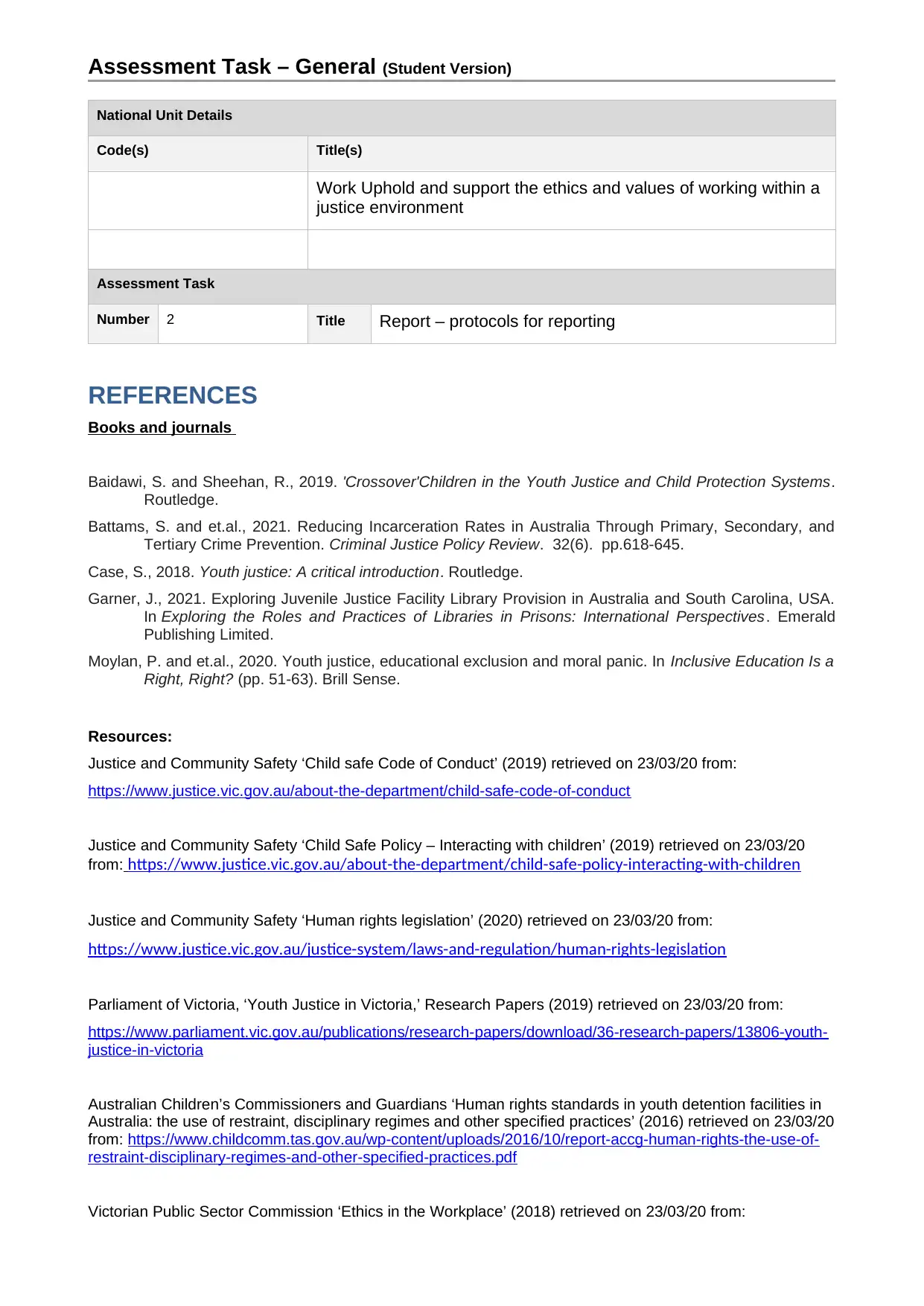
Assessment Task – General (Student Version)
National Unit Details
Code(s) Title(s)
Work Uphold and support the ethics and values of working within a
justice environment
Assessment Task
Number 2 Title Report – protocols for reporting
REFERENCES
Books and journals
Baidawi, S. and Sheehan, R., 2019. 'Crossover'Children in the Youth Justice and Child Protection Systems.
Routledge.
Battams, S. and et.al., 2021. Reducing Incarceration Rates in Australia Through Primary, Secondary, and
Tertiary Crime Prevention. Criminal Justice Policy Review. 32(6). pp.618-645.
Case, S., 2018. Youth justice: A critical introduction. Routledge.
Garner, J., 2021. Exploring Juvenile Justice Facility Library Provision in Australia and South Carolina, USA.
In Exploring the Roles and Practices of Libraries in Prisons: International Perspectives. Emerald
Publishing Limited.
Moylan, P. and et.al., 2020. Youth justice, educational exclusion and moral panic. In Inclusive Education Is a
Right, Right? (pp. 51-63). Brill Sense.
Resources:
Justice and Community Safety ‘Child safe Code of Conduct’ (2019) retrieved on 23/03/20 from:
https://www.justice.vic.gov.au/about-the-department/child-safe-code-of-conduct
Justice and Community Safety ‘Child Safe Policy – Interacting with children’ (2019) retrieved on 23/03/20
from: https://www.justice.vic.gov.au/about-the-department/child-safe-policy-interacting-with-children
Justice and Community Safety ‘Human rights legislation’ (2020) retrieved on 23/03/20 from:
https://www.justice.vic.gov.au/justice-system/laws-and-regulation/human-rights-legislation
Parliament of Victoria, ‘Youth Justice in Victoria,’ Research Papers (2019) retrieved on 23/03/20 from:
https://www.parliament.vic.gov.au/publications/research-papers/download/36-research-papers/13806-youth-
justice-in-victoria
Australian Children’s Commissioners and Guardians ‘Human rights standards in youth detention facilities in
Australia: the use of restraint, disciplinary regimes and other specified practices’ (2016) retrieved on 23/03/20
from: https://www.childcomm.tas.gov.au/wp-content/uploads/2016/10/report-accg-human-rights-the-use-of-
restraint-disciplinary-regimes-and-other-specified-practices.pdf
Victorian Public Sector Commission ‘Ethics in the Workplace’ (2018) retrieved on 23/03/20 from:
National Unit Details
Code(s) Title(s)
Work Uphold and support the ethics and values of working within a
justice environment
Assessment Task
Number 2 Title Report – protocols for reporting
REFERENCES
Books and journals
Baidawi, S. and Sheehan, R., 2019. 'Crossover'Children in the Youth Justice and Child Protection Systems.
Routledge.
Battams, S. and et.al., 2021. Reducing Incarceration Rates in Australia Through Primary, Secondary, and
Tertiary Crime Prevention. Criminal Justice Policy Review. 32(6). pp.618-645.
Case, S., 2018. Youth justice: A critical introduction. Routledge.
Garner, J., 2021. Exploring Juvenile Justice Facility Library Provision in Australia and South Carolina, USA.
In Exploring the Roles and Practices of Libraries in Prisons: International Perspectives. Emerald
Publishing Limited.
Moylan, P. and et.al., 2020. Youth justice, educational exclusion and moral panic. In Inclusive Education Is a
Right, Right? (pp. 51-63). Brill Sense.
Resources:
Justice and Community Safety ‘Child safe Code of Conduct’ (2019) retrieved on 23/03/20 from:
https://www.justice.vic.gov.au/about-the-department/child-safe-code-of-conduct
Justice and Community Safety ‘Child Safe Policy – Interacting with children’ (2019) retrieved on 23/03/20
from: https://www.justice.vic.gov.au/about-the-department/child-safe-policy-interacting-with-children
Justice and Community Safety ‘Human rights legislation’ (2020) retrieved on 23/03/20 from:
https://www.justice.vic.gov.au/justice-system/laws-and-regulation/human-rights-legislation
Parliament of Victoria, ‘Youth Justice in Victoria,’ Research Papers (2019) retrieved on 23/03/20 from:
https://www.parliament.vic.gov.au/publications/research-papers/download/36-research-papers/13806-youth-
justice-in-victoria
Australian Children’s Commissioners and Guardians ‘Human rights standards in youth detention facilities in
Australia: the use of restraint, disciplinary regimes and other specified practices’ (2016) retrieved on 23/03/20
from: https://www.childcomm.tas.gov.au/wp-content/uploads/2016/10/report-accg-human-rights-the-use-of-
restraint-disciplinary-regimes-and-other-specified-practices.pdf
Victorian Public Sector Commission ‘Ethics in the Workplace’ (2018) retrieved on 23/03/20 from:
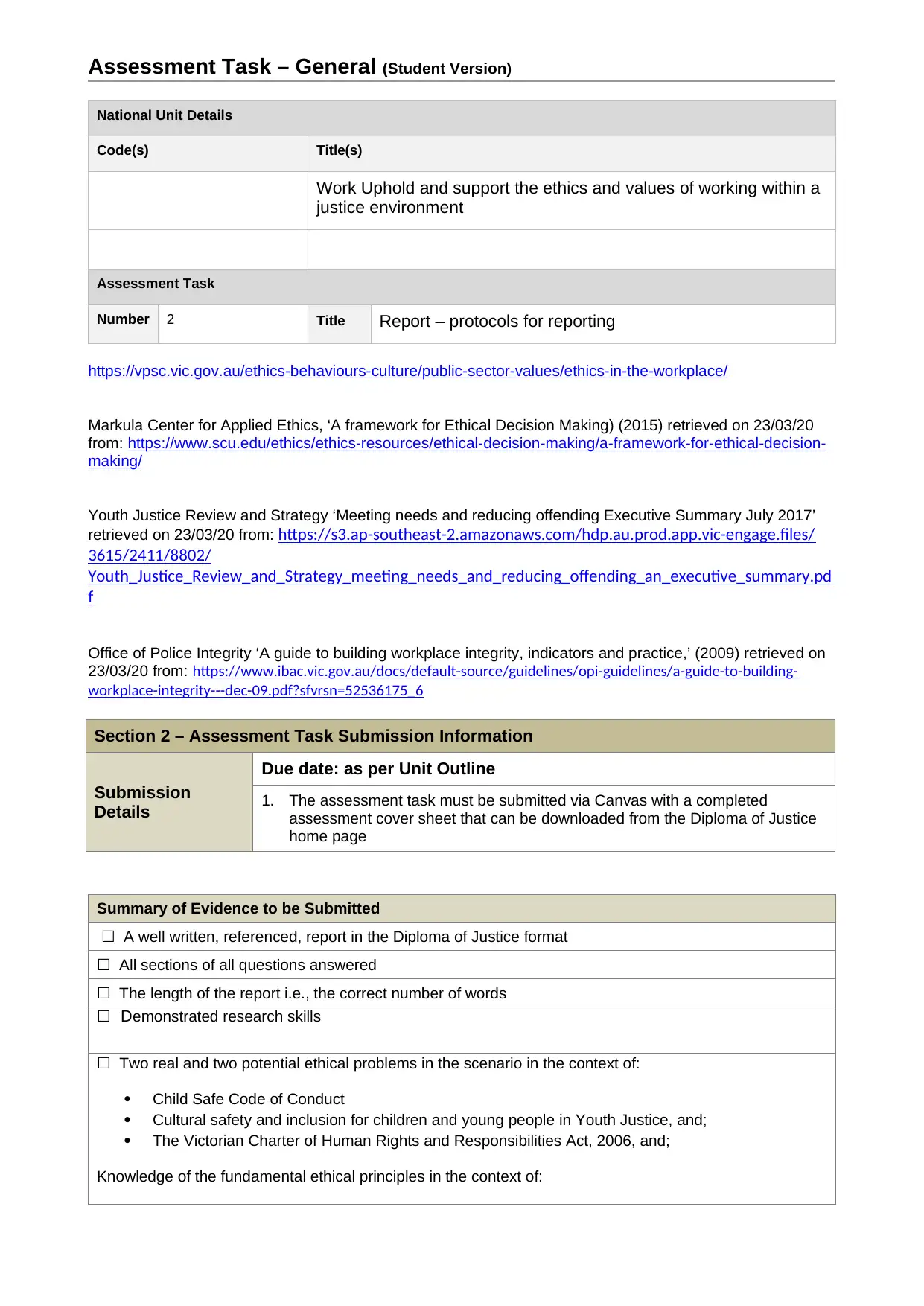
Assessment Task – General (Student Version)
National Unit Details
Code(s) Title(s)
Work Uphold and support the ethics and values of working within a
justice environment
Assessment Task
Number 2 Title Report – protocols for reporting
https://vpsc.vic.gov.au/ethics-behaviours-culture/public-sector-values/ethics-in-the-workplace/
Markula Center for Applied Ethics, ‘A framework for Ethical Decision Making) (2015) retrieved on 23/03/20
from: https://www.scu.edu/ethics/ethics-resources/ethical-decision-making/a-framework-for-ethical-decision-
making/
Youth Justice Review and Strategy ‘Meeting needs and reducing offending Executive Summary July 2017’
retrieved on 23/03/20 from: https://s3.ap-southeast-2.amazonaws.com/hdp.au.prod.app.vic-engage.files/
3615/2411/8802/
Youth_Justice_Review_and_Strategy_meeting_needs_and_reducing_offending_an_executive_summary.pd
f
Office of Police Integrity ‘A guide to building workplace integrity, indicators and practice,’ (2009) retrieved on
23/03/20 from: https://www.ibac.vic.gov.au/docs/default-source/guidelines/opi-guidelines/a-guide-to-building-
workplace-integrity---dec-09.pdf?sfvrsn=52536175_6
Section 2 – Assessment Task Submission Information
Submission
Details
Due date: as per Unit Outline
1. The assessment task must be submitted via Canvas with a completed
assessment cover sheet that can be downloaded from the Diploma of Justice
home page
Summary of Evidence to be Submitted
☐ A well written, referenced, report in the Diploma of Justice format
☐ All sections of all questions answered
☐ The length of the report i.e., the correct number of words
☐ Demonstrated research skills
☐ Two real and two potential ethical problems in the scenario in the context of:
Child Safe Code of Conduct
Cultural safety and inclusion for children and young people in Youth Justice, and;
The Victorian Charter of Human Rights and Responsibilities Act, 2006, and;
Knowledge of the fundamental ethical principles in the context of:
National Unit Details
Code(s) Title(s)
Work Uphold and support the ethics and values of working within a
justice environment
Assessment Task
Number 2 Title Report – protocols for reporting
https://vpsc.vic.gov.au/ethics-behaviours-culture/public-sector-values/ethics-in-the-workplace/
Markula Center for Applied Ethics, ‘A framework for Ethical Decision Making) (2015) retrieved on 23/03/20
from: https://www.scu.edu/ethics/ethics-resources/ethical-decision-making/a-framework-for-ethical-decision-
making/
Youth Justice Review and Strategy ‘Meeting needs and reducing offending Executive Summary July 2017’
retrieved on 23/03/20 from: https://s3.ap-southeast-2.amazonaws.com/hdp.au.prod.app.vic-engage.files/
3615/2411/8802/
Youth_Justice_Review_and_Strategy_meeting_needs_and_reducing_offending_an_executive_summary.pd
f
Office of Police Integrity ‘A guide to building workplace integrity, indicators and practice,’ (2009) retrieved on
23/03/20 from: https://www.ibac.vic.gov.au/docs/default-source/guidelines/opi-guidelines/a-guide-to-building-
workplace-integrity---dec-09.pdf?sfvrsn=52536175_6
Section 2 – Assessment Task Submission Information
Submission
Details
Due date: as per Unit Outline
1. The assessment task must be submitted via Canvas with a completed
assessment cover sheet that can be downloaded from the Diploma of Justice
home page
Summary of Evidence to be Submitted
☐ A well written, referenced, report in the Diploma of Justice format
☐ All sections of all questions answered
☐ The length of the report i.e., the correct number of words
☐ Demonstrated research skills
☐ Two real and two potential ethical problems in the scenario in the context of:
Child Safe Code of Conduct
Cultural safety and inclusion for children and young people in Youth Justice, and;
The Victorian Charter of Human Rights and Responsibilities Act, 2006, and;
Knowledge of the fundamental ethical principles in the context of:
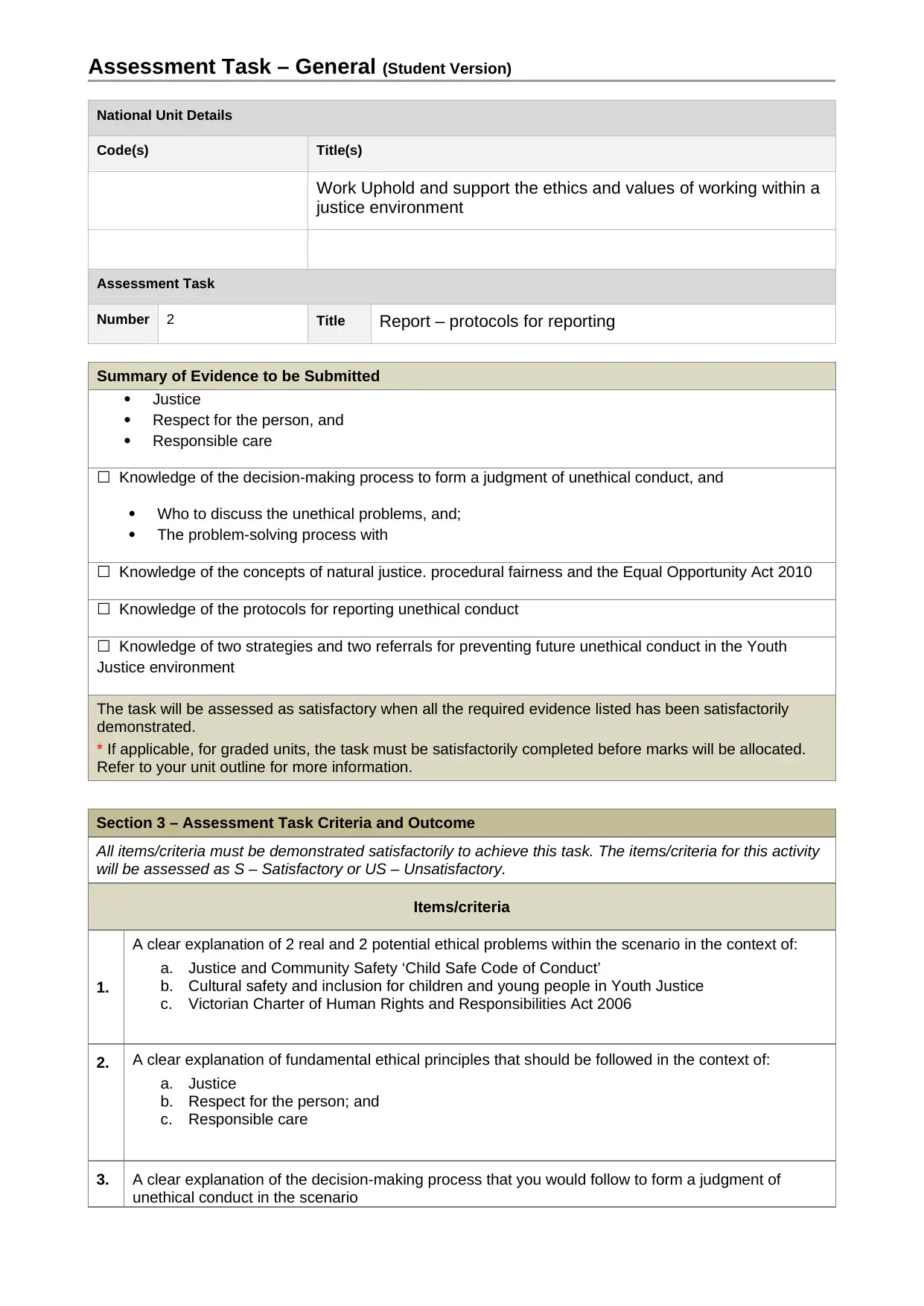
Assessment Task – General (Student Version)
National Unit Details
Code(s) Title(s)
Work Uphold and support the ethics and values of working within a
justice environment
Assessment Task
Number 2 Title Report – protocols for reporting
Summary of Evidence to be Submitted
Justice
Respect for the person, and
Responsible care
☐ Knowledge of the decision-making process to form a judgment of unethical conduct, and
Who to discuss the unethical problems, and;
The problem-solving process with
☐ Knowledge of the concepts of natural justice. procedural fairness and the Equal Opportunity Act 2010
☐ Knowledge of the protocols for reporting unethical conduct
☐ Knowledge of two strategies and two referrals for preventing future unethical conduct in the Youth
Justice environment
The task will be assessed as satisfactory when all the required evidence listed has been satisfactorily
demonstrated.
* If applicable, for graded units, the task must be satisfactorily completed before marks will be allocated.
Refer to your unit outline for more information.
Section 3 – Assessment Task Criteria and Outcome
All items/criteria must be demonstrated satisfactorily to achieve this task. The items/criteria for this activity
will be assessed as S – Satisfactory or US – Unsatisfactory.
Items/criteria
1.
A clear explanation of 2 real and 2 potential ethical problems within the scenario in the context of:
a. Justice and Community Safety ‘Child Safe Code of Conduct’
b. Cultural safety and inclusion for children and young people in Youth Justice
c. Victorian Charter of Human Rights and Responsibilities Act 2006
2. A clear explanation of fundamental ethical principles that should be followed in the context of:
a. Justice
b. Respect for the person; and
c. Responsible care
3. A clear explanation of the decision-making process that you would follow to form a judgment of
unethical conduct in the scenario
National Unit Details
Code(s) Title(s)
Work Uphold and support the ethics and values of working within a
justice environment
Assessment Task
Number 2 Title Report – protocols for reporting
Summary of Evidence to be Submitted
Justice
Respect for the person, and
Responsible care
☐ Knowledge of the decision-making process to form a judgment of unethical conduct, and
Who to discuss the unethical problems, and;
The problem-solving process with
☐ Knowledge of the concepts of natural justice. procedural fairness and the Equal Opportunity Act 2010
☐ Knowledge of the protocols for reporting unethical conduct
☐ Knowledge of two strategies and two referrals for preventing future unethical conduct in the Youth
Justice environment
The task will be assessed as satisfactory when all the required evidence listed has been satisfactorily
demonstrated.
* If applicable, for graded units, the task must be satisfactorily completed before marks will be allocated.
Refer to your unit outline for more information.
Section 3 – Assessment Task Criteria and Outcome
All items/criteria must be demonstrated satisfactorily to achieve this task. The items/criteria for this activity
will be assessed as S – Satisfactory or US – Unsatisfactory.
Items/criteria
1.
A clear explanation of 2 real and 2 potential ethical problems within the scenario in the context of:
a. Justice and Community Safety ‘Child Safe Code of Conduct’
b. Cultural safety and inclusion for children and young people in Youth Justice
c. Victorian Charter of Human Rights and Responsibilities Act 2006
2. A clear explanation of fundamental ethical principles that should be followed in the context of:
a. Justice
b. Respect for the person; and
c. Responsible care
3. A clear explanation of the decision-making process that you would follow to form a judgment of
unethical conduct in the scenario
Secure Best Marks with AI Grader
Need help grading? Try our AI Grader for instant feedback on your assignments.
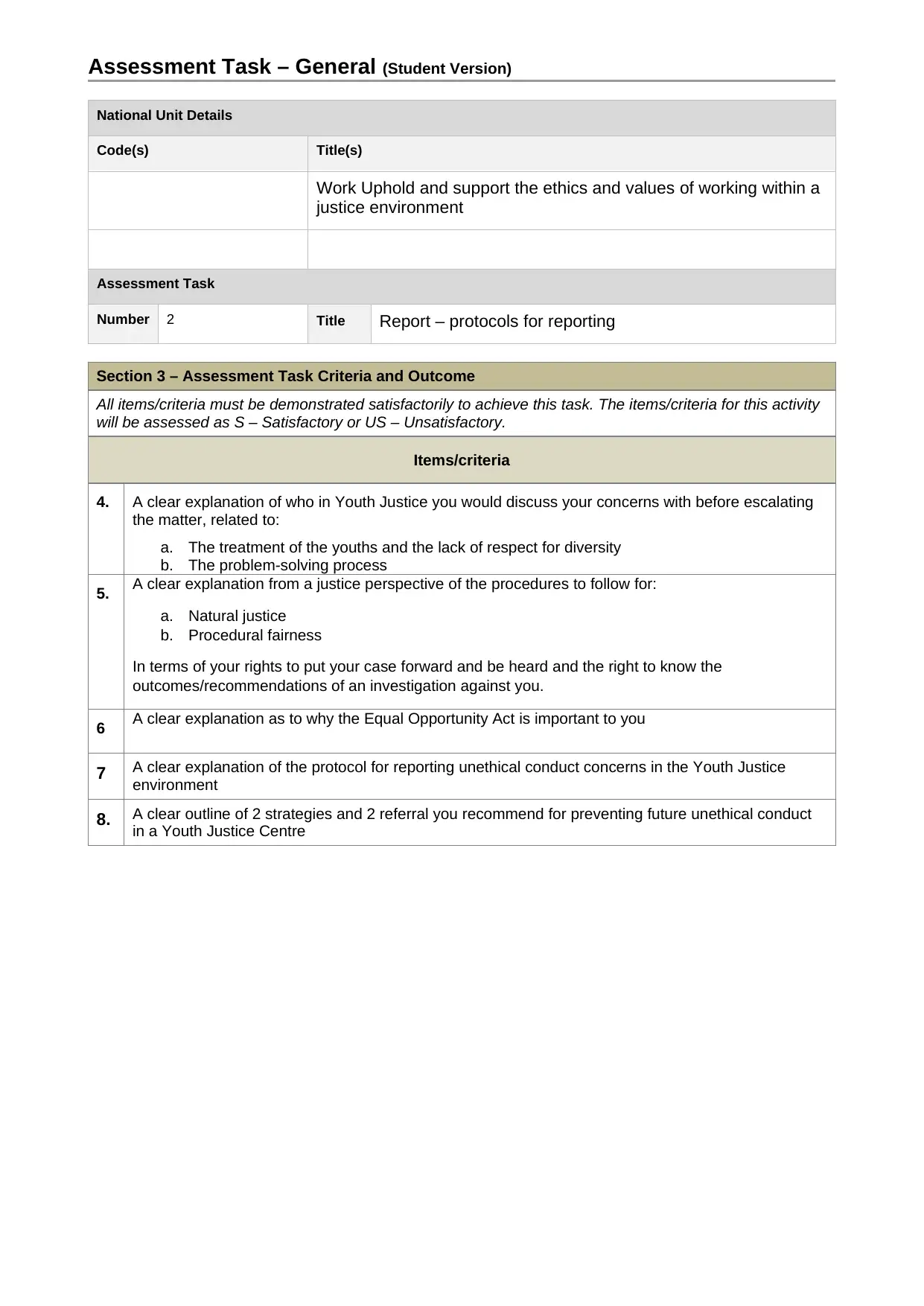
Assessment Task – General (Student Version)
National Unit Details
Code(s) Title(s)
Work Uphold and support the ethics and values of working within a
justice environment
Assessment Task
Number 2 Title Report – protocols for reporting
Section 3 – Assessment Task Criteria and Outcome
All items/criteria must be demonstrated satisfactorily to achieve this task. The items/criteria for this activity
will be assessed as S – Satisfactory or US – Unsatisfactory.
Items/criteria
4. A clear explanation of who in Youth Justice you would discuss your concerns with before escalating
the matter, related to:
a. The treatment of the youths and the lack of respect for diversity
b. The problem-solving process
5. A clear explanation from a justice perspective of the procedures to follow for:
a. Natural justice
b. Procedural fairness
In terms of your rights to put your case forward and be heard and the right to know the
outcomes/recommendations of an investigation against you.
6 A clear explanation as to why the Equal Opportunity Act is important to you
7 A clear explanation of the protocol for reporting unethical conduct concerns in the Youth Justice
environment
8. A clear outline of 2 strategies and 2 referral you recommend for preventing future unethical conduct
in a Youth Justice Centre
National Unit Details
Code(s) Title(s)
Work Uphold and support the ethics and values of working within a
justice environment
Assessment Task
Number 2 Title Report – protocols for reporting
Section 3 – Assessment Task Criteria and Outcome
All items/criteria must be demonstrated satisfactorily to achieve this task. The items/criteria for this activity
will be assessed as S – Satisfactory or US – Unsatisfactory.
Items/criteria
4. A clear explanation of who in Youth Justice you would discuss your concerns with before escalating
the matter, related to:
a. The treatment of the youths and the lack of respect for diversity
b. The problem-solving process
5. A clear explanation from a justice perspective of the procedures to follow for:
a. Natural justice
b. Procedural fairness
In terms of your rights to put your case forward and be heard and the right to know the
outcomes/recommendations of an investigation against you.
6 A clear explanation as to why the Equal Opportunity Act is important to you
7 A clear explanation of the protocol for reporting unethical conduct concerns in the Youth Justice
environment
8. A clear outline of 2 strategies and 2 referral you recommend for preventing future unethical conduct
in a Youth Justice Centre
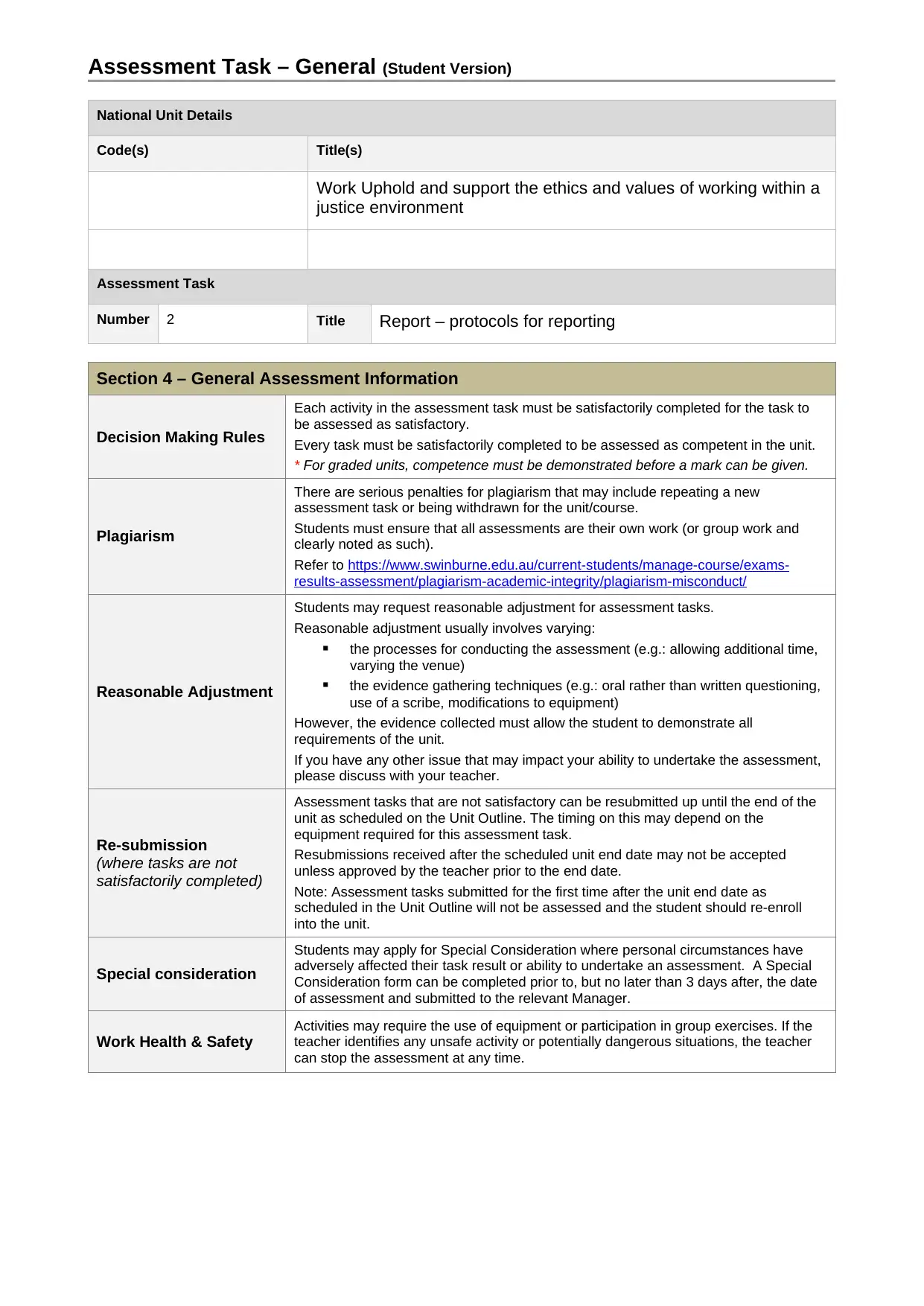
Assessment Task – General (Student Version)
National Unit Details
Code(s) Title(s)
Work Uphold and support the ethics and values of working within a
justice environment
Assessment Task
Number 2 Title Report – protocols for reporting
Section 4 – General Assessment Information
Decision Making Rules
Each activity in the assessment task must be satisfactorily completed for the task to
be assessed as satisfactory.
Every task must be satisfactorily completed to be assessed as competent in the unit.
* For graded units, competence must be demonstrated before a mark can be given.
Plagiarism
There are serious penalties for plagiarism that may include repeating a new
assessment task or being withdrawn for the unit/course.
Students must ensure that all assessments are their own work (or group work and
clearly noted as such).
Refer to https://www.swinburne.edu.au/current-students/manage-course/exams-
results-assessment/plagiarism-academic-integrity/plagiarism-misconduct/
Reasonable Adjustment
Students may request reasonable adjustment for assessment tasks.
Reasonable adjustment usually involves varying:
the processes for conducting the assessment (e.g.: allowing additional time,
varying the venue)
the evidence gathering techniques (e.g.: oral rather than written questioning,
use of a scribe, modifications to equipment)
However, the evidence collected must allow the student to demonstrate all
requirements of the unit.
If you have any other issue that may impact your ability to undertake the assessment,
please discuss with your teacher.
Re-submission
(where tasks are not
satisfactorily completed)
Assessment tasks that are not satisfactory can be resubmitted up until the end of the
unit as scheduled on the Unit Outline. The timing on this may depend on the
equipment required for this assessment task.
Resubmissions received after the scheduled unit end date may not be accepted
unless approved by the teacher prior to the end date.
Note: Assessment tasks submitted for the first time after the unit end date as
scheduled in the Unit Outline will not be assessed and the student should re-enroll
into the unit.
Special consideration
Students may apply for Special Consideration where personal circumstances have
adversely affected their task result or ability to undertake an assessment. A Special
Consideration form can be completed prior to, but no later than 3 days after, the date
of assessment and submitted to the relevant Manager.
Work Health & Safety
Activities may require the use of equipment or participation in group exercises. If the
teacher identifies any unsafe activity or potentially dangerous situations, the teacher
can stop the assessment at any time.
National Unit Details
Code(s) Title(s)
Work Uphold and support the ethics and values of working within a
justice environment
Assessment Task
Number 2 Title Report – protocols for reporting
Section 4 – General Assessment Information
Decision Making Rules
Each activity in the assessment task must be satisfactorily completed for the task to
be assessed as satisfactory.
Every task must be satisfactorily completed to be assessed as competent in the unit.
* For graded units, competence must be demonstrated before a mark can be given.
Plagiarism
There are serious penalties for plagiarism that may include repeating a new
assessment task or being withdrawn for the unit/course.
Students must ensure that all assessments are their own work (or group work and
clearly noted as such).
Refer to https://www.swinburne.edu.au/current-students/manage-course/exams-
results-assessment/plagiarism-academic-integrity/plagiarism-misconduct/
Reasonable Adjustment
Students may request reasonable adjustment for assessment tasks.
Reasonable adjustment usually involves varying:
the processes for conducting the assessment (e.g.: allowing additional time,
varying the venue)
the evidence gathering techniques (e.g.: oral rather than written questioning,
use of a scribe, modifications to equipment)
However, the evidence collected must allow the student to demonstrate all
requirements of the unit.
If you have any other issue that may impact your ability to undertake the assessment,
please discuss with your teacher.
Re-submission
(where tasks are not
satisfactorily completed)
Assessment tasks that are not satisfactory can be resubmitted up until the end of the
unit as scheduled on the Unit Outline. The timing on this may depend on the
equipment required for this assessment task.
Resubmissions received after the scheduled unit end date may not be accepted
unless approved by the teacher prior to the end date.
Note: Assessment tasks submitted for the first time after the unit end date as
scheduled in the Unit Outline will not be assessed and the student should re-enroll
into the unit.
Special consideration
Students may apply for Special Consideration where personal circumstances have
adversely affected their task result or ability to undertake an assessment. A Special
Consideration form can be completed prior to, but no later than 3 days after, the date
of assessment and submitted to the relevant Manager.
Work Health & Safety
Activities may require the use of equipment or participation in group exercises. If the
teacher identifies any unsafe activity or potentially dangerous situations, the teacher
can stop the assessment at any time.
1 out of 12
Related Documents
Your All-in-One AI-Powered Toolkit for Academic Success.
+13062052269
info@desklib.com
Available 24*7 on WhatsApp / Email
![[object Object]](/_next/static/media/star-bottom.7253800d.svg)
Unlock your academic potential
© 2024 | Zucol Services PVT LTD | All rights reserved.





